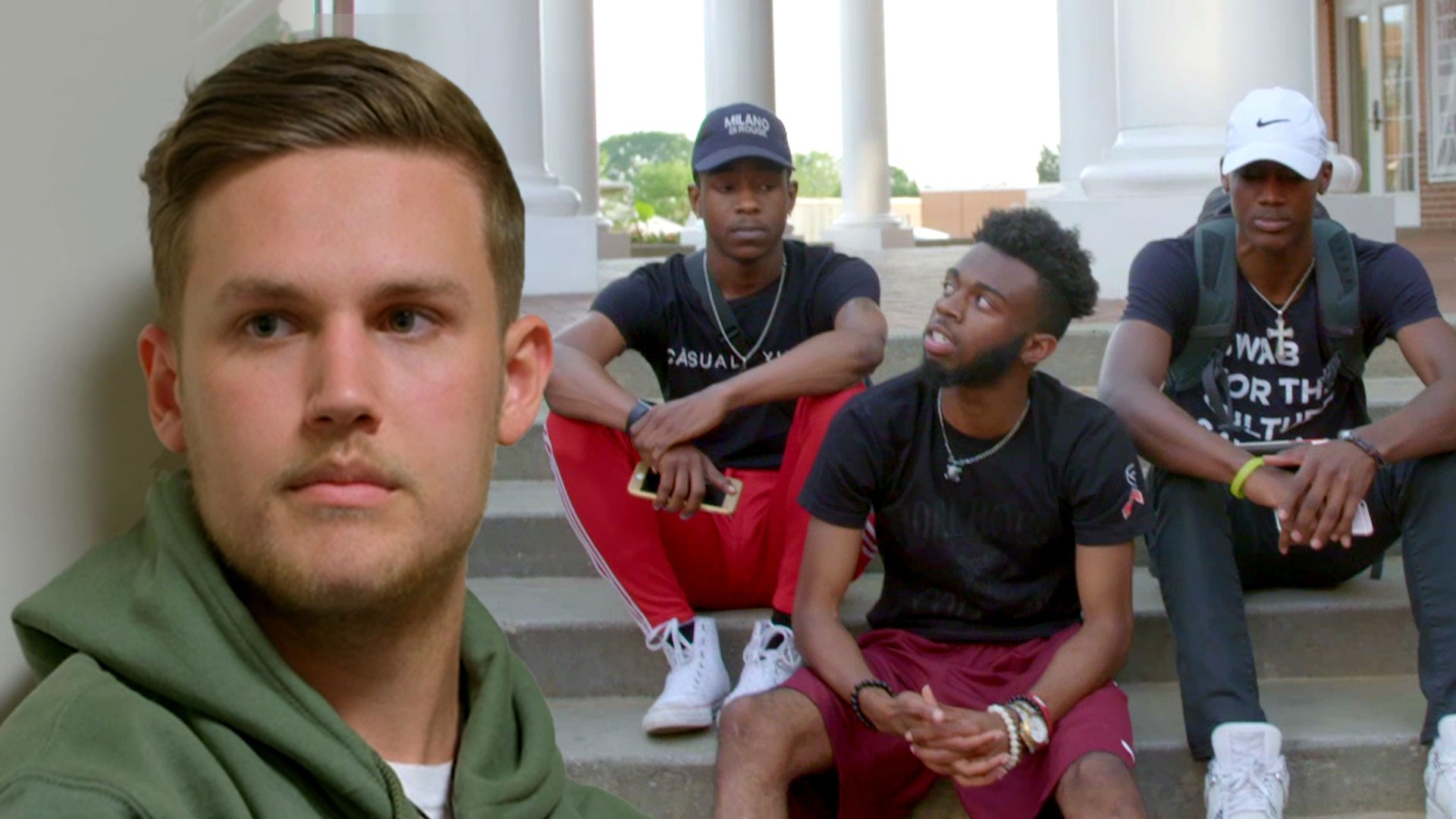Actress Lori Loughlin and her husband Mossimo Giannulli, wearing green tie at left, leave the John Joseph Moakley United States Courthouse in Boston on April 3, 2019. (Photo by Pat Greenhouse/The Boston Globe via Getty Images)
Lori Loughlin greeted federal prosecutors with a bleach-white grin and a handshake. “Hi, how are you?” she whispered, as if she were making her way through a table of fans rather than a team of government lawyers ostensibly aiming to put her behind bars.The actress best known as “Aunt Becky” from 90s sitcom Full House had been spotted signing autographs for (mostly adoring) fans outside Boston federal court mere minutes earlier. The cordial approach didn't appear to be received quite as warmly by prosecutors.

Loughlin was one of a dozen parents who went before a judge Wednesday in connection with a sprawling college cheating scam that blew into the open last month, dredging up long-simmering class resentment in the national conversation. Along with actress Felicity Huffman and other less well-known (if also wealthy) defendants, Loughlin and her husband, fashion designer Mossimo Giannulli, face up to 20 years in prison if convicted of conspiracy to commit mail fraud and honest services mail fraud. In Loughlin and Giannulli’s case, prosecutors said, that meant bribing a University of Southern California athletics official to pretend to prize their daughters’ nonexistent crew skills.Loughlin and Giannulli were arrested in California last month and released on a one million dollar bond. They are accused of effectively paying $500,000 to get their two daughters into USC.Huffman, best known for her role on ABC’s Desperate Housewives and charged with the same crimes, is accused of paying $15,000 to arrange for a special proctor to oversee her daughter’s SAT test and boost her score. Her husband, actor William M. Macy, has not been charged in the scheme—though he did appear to have some knowledge of the larger saga, as the New York Times reported last month—and did not join her in court Wednesday.The actual legal business on Wednesday was relatively trivial stuff. Neither of the biggest names on hand entered a plea in the case. Instead, before Magistrate Judge M. Page Kelly, defendants acknowledged their right to remain silent, agreed to remove firearms from their homes, and promised to refrain from committing crimes while out on bail, including marijuana use—still a felony, they were reminded. Kelly lifted restrictions on talking about the case with their children, but added that they should consult with their attorneys regarding the laws surrounding obstruction of justice given their kids are, after all, potential witnesses in any trials.It wasn’t a surprise that members of the media and the public swarmed the courthouse Wednesday afternoon, hungry for a glimpse of famous defendants who allegedly committed absurd crimes for their elite offspring. But it speaks to just how much of a nerve this saga has struck that the crush of people gathered outside the courthouse appeared to match if not exceed that of even the most eventful days of the Boston Marathon bombing trial, which I covered at the same courthouse in 2015.Most parents waived their rights to official pre-trial hearings (Wednesday was technically an “initial appearance” for many of them). But perhaps more important to those watching closely, the defendants were herded in and out of court by well-coiffed teams of the best A-List attorneys money can buy in what amounted to an exhibit of entrenched disparities in America's legal system.Loughlin and her husband were flanked by lawyers from high-powered firm Latham and Watkins, including Perry Viscounty, himself a USC grad who counts Apple, Tesla, and Craigslist as former clients. William J. Trach, who was one of the National Law Journal’s 40 under 40 in 2014, and who has repped Zipcar and Phillip Morris, was also on hand. Finally, the duo enlisted the counsel of Sean M. Berkowitz—the man who, as a federal prosecutor, led the Justice Department’s Enron task-force, and after his victory in that case announced, “No matter how rich and powerful you are, you have to play by the rules.”For her part, Huffman was represented by Marty Murphy of Foley Hoag, a former federal prosecutor and recent independent sex crimes investigator at St. George's Prep School in Rhode Island. That ex-prosecutors were now being employed by wealthy defendants was not unique to the case, but that revolving door has nonetheless come under withering criticism in recent years.Perhaps more notable than the celebrity welcome enjoyed by the defendants was just that—the show of wealth exemplified by the legal teams they employed. While US Attorney Andrew E. Lelling claimed last month there was no separate criminal justice system for the wealthy, experts suggested this case was likely to test that mantra to the extreme.As Jeffrey A. Fagan, an expert on criminal justice at Columbia Law School put it, “You get what you pay for. It’s really as simple as that.”While many public defenders are talented, too often they are massively overworked. Meanwhile, the defendants like those caught up in Operation Varsity Blues, as the cheating probe was dubbed, are hiring people with “very limited case loads,” Fagan noted, who can provide their clients with a lot more attention, care and time.“The difference is night and day,” he said, adding, “Courts and lawyers will say representation is representation,” but that’s not really the case.Robert H. Frank, an economics professor at Cornell University, said there was “enormous inequality in legal outcomes” based on the ability of defendants to pay for A-List representation. Case in point, he noted, was disgraced political consultant Paul Manafort, sentenced to 47 months in jail for eight counts of bank fraud, filing fake tax returns, and failure to report foreign assets, while another defendant was offered a similar sentence for stealing $100 worth of quarters from a laundry room. (Manafort was subsequently sentenced to additional time in a separate case in which he was convicted on conspiracy charges.)Not only are wealthy defendants able to hire better representation, they are often treated better by virtue of being wealthy, and less likely to enter the criminal justice system in the first place, added Frank, who recently authored a journal article titled How Rising Income Inequality Threatens Access to the Legal System.Chiraag Bains, the legal director at left-leaning think tank Demos who previously worked at the Civil Rights Division at the Justice Department, agreed. “Representation can vary wildly, and it matters crucially to how your case turns out,” he said, adding that while a key factor is wealth, the result of this is often a breakdown along racial lines, in which white people have access to better representation than people of color—“that’s an aspect I saw over and over again in the criminal justice system,” he said.In court documents, William Rick Singer, the admitted ringleader of the cheating operation, referred to the techniques he used—like paying impersonators to take standardized tests and bribing college coaches—as a “side door” entrance to elite academic institutions. Loughlin, Huffman, and the other parents in this case may not have a “side door” by which to prevail in their criminal case: They can’t hire someone to appear in court for them, or serve time, if they are tried and sentenced to prison. But defendants like them can hire fancy legal mavens (or even pricey prison sherpas) to prepare them for that eventuality.Throw enough money at the case, and the criminal justice system, just like academia, may yet tilt in their favor.Sign up for our newsletter to get the best of VICE delivered to your inbox daily.Follow Susan Zalkind on Twitter.
Advertisement

Loughlin was one of a dozen parents who went before a judge Wednesday in connection with a sprawling college cheating scam that blew into the open last month, dredging up long-simmering class resentment in the national conversation. Along with actress Felicity Huffman and other less well-known (if also wealthy) defendants, Loughlin and her husband, fashion designer Mossimo Giannulli, face up to 20 years in prison if convicted of conspiracy to commit mail fraud and honest services mail fraud. In Loughlin and Giannulli’s case, prosecutors said, that meant bribing a University of Southern California athletics official to pretend to prize their daughters’ nonexistent crew skills.Loughlin and Giannulli were arrested in California last month and released on a one million dollar bond. They are accused of effectively paying $500,000 to get their two daughters into USC.Huffman, best known for her role on ABC’s Desperate Housewives and charged with the same crimes, is accused of paying $15,000 to arrange for a special proctor to oversee her daughter’s SAT test and boost her score. Her husband, actor William M. Macy, has not been charged in the scheme—though he did appear to have some knowledge of the larger saga, as the New York Times reported last month—and did not join her in court Wednesday.The actual legal business on Wednesday was relatively trivial stuff. Neither of the biggest names on hand entered a plea in the case. Instead, before Magistrate Judge M. Page Kelly, defendants acknowledged their right to remain silent, agreed to remove firearms from their homes, and promised to refrain from committing crimes while out on bail, including marijuana use—still a felony, they were reminded. Kelly lifted restrictions on talking about the case with their children, but added that they should consult with their attorneys regarding the laws surrounding obstruction of justice given their kids are, after all, potential witnesses in any trials.
Advertisement
Advertisement
Advertisement
